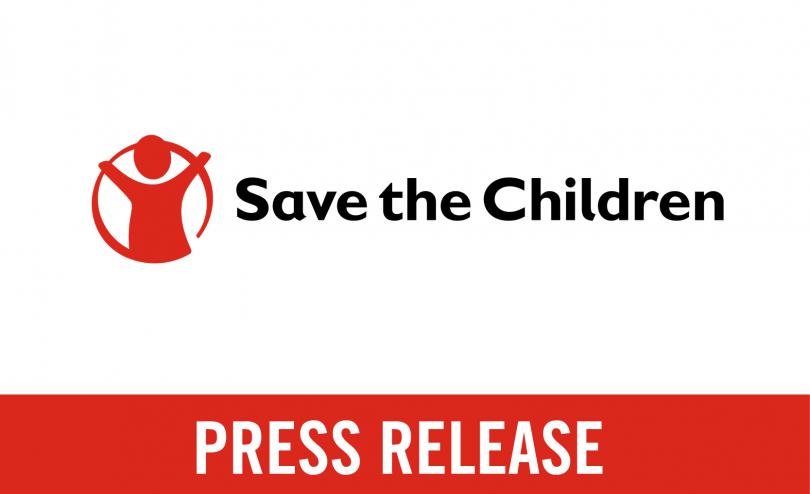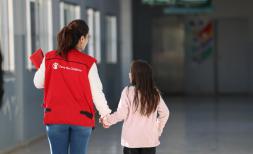Three ripple effects of the Ukraine crisis on children around the world

Russsia’s military operation in Ukraine has already seen millions of children forced from their homes, with some fleeing across the border into neighbouring countries while others are seeking safety in underground shelters. At least 17 children are reported to have been killed to date.
But the escalation in violence is also set to impact children in need in other countries at a time when they are already bearing the brunt of the fallout from the COVID-19 pandemic, the climate emergency, and the world’s worst hunger crisis this century.
Save the Children outlines three ways that children beyond Eastern Europe could be affected by the Ukraine crisis:
1) Risk of Hunger
The global reliance on Russia and Ukraine’s wheat supply – making up more than a quarter of the world’s wheat in 2019 – could end up cutting off this staple to populations in already fragile contexts, such as Yemen and Lebanon, and driving prices to skyrocket. In Lebanon, up to 80% of wheat imports come from Russia and Ukraine.
The world is already facing the worst global hunger crisis this century, with an estimated 45 million people across 43 countries at risk of famine, up from 27 million in 2019. This is having a disastrous impact on children, who are always the most vulnerable in a food crisis. In 2020, almost 50 million children under the age of five were acutely malnourished[i].
Save the Children said that an immediate end to violence in Ukraine would not only protect children in the country but also prevent the deterioration of an already catastrophic situation for children and families beyond Europe who depend on exports for survival.
2) Mental health
Clearly children in Ukraine are suffering the most psychological distress as a result of Russia’s military operation. But our digital age means that any child with access to a TV, radio, newspaper, computer or phone will be aware that there is conflict going on – and many of them will be starting to understand the impact on other children. How do you talk to your child about war?
Ane Lemche, a psychologist and child counsellor with Save the Children, said: “What is happening in Ukraine can be frightening for both children and adults. Ignoring or avoiding the topic can lead to children feeling lost, alone and more scared, which can affect their health and wellbeing. It is essential to have open and honest conversations with children to help them process what is happening.”
Parents and caregivers can read more tools and tips to approach the conversation with children here.
3) Energy poverty
Global – in particular, European – reliance on Russian oil and gas has come into sharper focus, as the cost of Brent crude oil has surged to its highest level since 2012, and natural gas contracts have risen by an incredible 35%[ii]. Europe is reliant on Russia for 40% of its natural gas supplies.
Save the Children has already warned that these rising prices will add to the already escalating cost of living crisis in the UK.
Dan Paskins, Director of UK Impact at Save the Children, said: “The prospect of energy price rising even more than has already been forecast is incredibly worrying for households on low incomes. Millions of parents will be wondering how they will be able to keep their families afloat in the months ahead.
“We’re already seeing families having to make impossible choices between heating their homes and feeding their children. Parents we work with say they just don’t know what they’re going to cut back on next. A further increase in energy bills will leave even more children living in cold and damp homes, going to bed hungry, and missing out on the opportunities they need to grow and thrive.”
NOTES TO EDITORS:
- Save the Children has been operating in Ukraine since 2014, delivering essential humanitarian aid to children and their families. This includes supporting their access to education, providing psychosocial support, distributing winter kits and hygiene kits, and providing cash grants to families so they can meet basic needs such as food, rent and medicines, or so they can invest in new businesses.
- We now have a team in Poland, coordinating with local partners to assess the situation and respond to needs as quickly as we can. In Romania, Save the Children staff and volunteers continue to help refugees arriving from Ukraine at the border and in reception centres with provision of basic non-food items and other outreach services.
- For many years now, Save the Children has been working with refugee and migrant children inside and outside of Europe, aiming to support vulnerable children with the greatest needs. We run reception centres providing child friendly activities and work on informing children about their rights in Germany, Spain, the Netherlands, Sweden, Italy and Norway. In Italy, we also support relocation efforts, train temporary legal guardians who assist children during their asylum procedures, and work with UN agencies to ensure unaccompanied migrant children are protected.
For further enquiries please contact:
- Emily Wight, Emily.Wight@savethechildren.org
- Our media out of hours (BST) contact is media@savethechildren.org.uk / +44(0)7831 650409
[i] 2020 Global Nutrition Report
[ii] New York Mercantile Exchange, 3 March 2022




